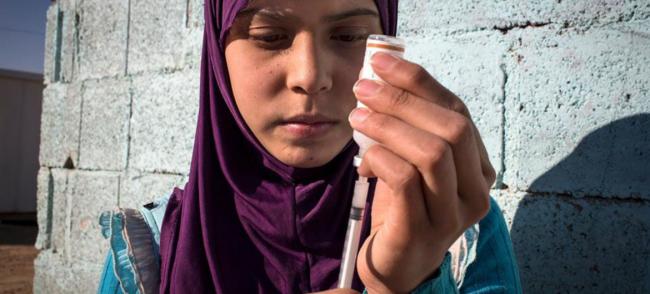
New York, Nov 15 (IBNS): The global prevalence of adult diabetes has nearly quadrupled since 1980, the World Health Organization (WHO) said on Wednesday, World Diabetes Day, with the call to “eat healthily, be physically active and avoid excessive weight gain.”
Diabetes is a chronic disease that occurs when the pancreas does not produce enough insulin, or when the body cannot effectively use the insulin it produces, which leads to an increased concentration of glucose in the blood. Around 1.6 million deaths can be directly attributed to diabetes each year.
“Diabetes is a major cause of blindness, kidney failure, heart attack, stroke and lower limb amputation,” said WHO, noting that about 422 million adults have the disease – a number that has been increasing steadily over the last three decades.
WHO Spokesperson Fadela Chaib said that was largely due to changes in lifestyle: “We are eating more heavy foods, full of fat and sugar; we are less physically active; and we have a more sedentary way of living.”
As one of the leading causes of death globally, diabetes is a major public health problem, one of four priority non-communicable diseases targeted for action by world leaders, according to WHO.
Even when blood glucose levels are not high enough to warrant a diagnosis of diabetes, damage can occur to the body, elevating the risk of cardiovascular disease.
In 2012 diabetes took 1.5 million lives and higher-than-optimal levels of blood glucose another 2.2 million. Of the 3.7 million people who died, 43 per cent occurred before the age of 70.
Over the past four decades, diabetes prevalence has risen faster in low- and middle-income countries. In this image, a nurse from Thane Civil Hospital in India checks the level of sugar in the blood of diabetic patients. WHO/Atul Loke
“The percentage of deaths attributable to high blood glucose or diabetes that occurs prior to age 70 is higher in low- and middle-income countries than in high-income countries,” cited WHO in its Global Report on Diabetes.
Type 1 diabetes, previously known as childhood-onset diabetes, is characterized by a lack of insulin production and requires daily insulin to regulate blood glucose. The cause of type 1 diabetes is not known.
However, the majority of people are affected by type 2 diabetes, which results from the body’s ineffective use of insulin. Healthy diet, physical activity and avoiding tobacco use can prevent or delay its onset. Additionally, medication, regular screening and treatment for complications are also available.
“An accurate diagnosis is the first step to getting effective treatment,” WHO Director-General Tedros Adhanom Ghebreyesus said earlier this year.
In its report, WHO called on governments to “ensure that people are able to make healthy choices and that health systems are able to diagnose, treat and care for people with diabetes,” and encouraged everyone to “eat healthily, be physically active, and avoid excessive weight gain.”
The UN General Assembly designated 14 November as World Diabetes Day back in 2007, recognizing “the urgent need to pursue multilateral efforts to promote and improve human health, and provide access to treatment and health-care education.”
WHO/T. Habjouqa
Support Our Journalism
We cannot do without you.. your contribution supports unbiased journalism
IBNS is not driven by any ism- not wokeism, not racism, not skewed secularism, not hyper right-wing or left liberal ideals, nor by any hardline religious beliefs or hyper nationalism. We want to serve you good old objective news, as they are. We do not judge or preach. We let people decide for themselves. We only try to present factual and well-sourced news.







